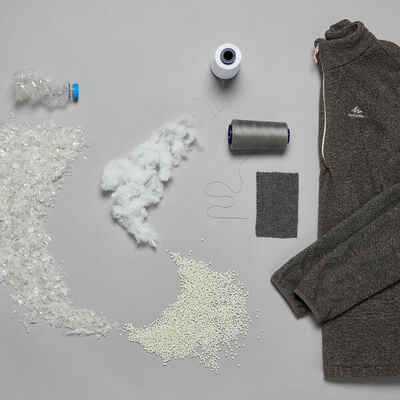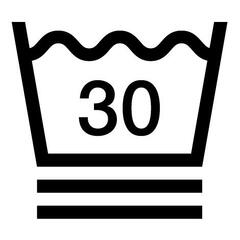How can I prevent snow from getting in when I fall?
The snow skirt (which is automatic), as well as the adjustable cuffs, prevent the entry of snow and air during practice and especially in case of a fall.
How can you reactivate the water-repellency of your jacket?
Bear in mind that the water-repellent feature can be reactivated. To do this, you can use a waterproof spray (sold in our stores): spray the product evenly over the entire garment, then leave it to dry for 10 to 12 hours).
How is comfortable temperature measured?
We lab-test each of our products so that we can provide you with a indicative value on the item's comfort. This comfort indicator is measured without tights for trousers, and with a thermal t-shirt and a fleece for jackets. The measurement indicated is that of the external temperature in which the testers are neither warm, nor cold. Of course, this perceived temperature varies in line with the intensity of the activity and the metabolism of the individual.
How is the water resistance of a jacket measured?
The resistance of a fabric is measured by the height of a water column in mm that can be supported by the fabric (test based on the ISO 811 standard). The higher the pressure, the more waterproof the fabric. This component has a waterproofing resistance of 10000 mm resists the pressure of 10000 mm of water.
For skiing, we advise components rated 3000 to 20,000 mm.
Plus, here at Decathlon, we lab-test all of our waterproof products. This product has a score of 3/5
How to dress to stay warm on the slopes?
To make sure you stay warm and dry, we recommend using the 3-technical-layer rule:
- Layer 1 or a second skin, to stay dry.
- Layer 2 or an insulating layer, to keep the heat in.
- Layer 3 or a protective layer to protect against the elements.
How to dry my jacket?
Dry in a tumble dryer (strongly recommended)
* Use a gentle or delicate programme.
* Dry on several long cycles to dry completely.
* Between 2 cycles, shake the down to break up the clumps of feathers which form during washing.
If you do not have a tumble dryer, the process is longer. (drying can take 1 to 2 weeks on a dry and flat place). Make sure you pat the jacket to avoid feather balls (at least 4-5 times)
How to wash my jacket?
* Close all the zips on the quilted jacket
* Turn it inside out
* Machine wash at 30°, delicate programme with little detergent & without fabric softener.
Important:set to a very gently spin cycle (less than 800 rev/min):too strong a spin could create feather balls that are difficult to undo
* Put 2 clean, ideally white, tennis balls in the drum of the washing machine.
* Perform a 2nd or 3rd rinse cycle to make sure that any washing product that remains from the previous wash has been eliminated
This product is repairable
We commit to repairing your product free of charge for the duration of the warranty. Whatever it is, fixings, seams, zips, etc. This service is offered in your usual store. However, if we can't repair your product (production defect), we will exchange it or reimburse you.
To help you choose the right size
The model on the photo is wearing a size M and measures 185 cm.
Measurements:
Chest measurement: 104 cm
Waist measurement: 104 cm
Arm length: 45 cm
Inside leg length: 80 cm
What is a "breathable" jacket?
This garment wicks away the water vapour produced by your body when exercising. To see if a fabric is breathable, its resistance to evaporative heat (RET) is measured in a standardised ISO 11092 test. The lower the RET, the more breathable the fabric. The jacket 500 has an RET of 11. However, it is the technical solutions (zips, vents, mesh) that Wedze uses, which reduce the condensation inside the garment and maximise breathability.
What is a membrane and what's it for?
The membrane is a very fine component applied to the inner surface of the outer jacket fabric. This hydrophilic component prevents water from seeping in while wicking away the perspiration produced by the body. The membrane is unbeatable when it comes to staying warm and dry.
What is the fit of the 500 jacket?
REGULAR fit. The jacket has sides that fall straight and remain parallel rather than trying to follow the shape of your body. The interior volume means this jacket can be worn in combination with a first and second technical layer.
What type of padding is used to provide warmth?
Recognised for their excellent thermal insulation, down and feathers also offer an excellent ratio of warmth to weight and compression. However, remember that the warmth provided comes from the combination of the weighting of down/feathers and the expansion capacity of the jacket. Indeed, together, they provide you with warmth and insulate you from the cold. (Padding 50% down and 50% feathers in the body, recycled wadding 100g/sqm at the bottom of jacket and arms, 60g/sqm on the collar).
Where do the feathers come from?
Thanks to our traceability system, we can guarantee the origin of the feathers in accordance with our commitment to use responsible materials. Our suppliers are committed to using only feathers that come from ducks that are raised for their meat and plucked after slaughter.
http://developpement-durable.decathlon.com/faq/
Which components are added to the padding give it warmth?
In addition to its filling, your jacket's waterproof zips, snow skirt, collar and adjustable hood and cuffs offer better protection against the cold for a warmer feeling.
Which parts of the jacket protect me from bad weather?
The 500 jacket has been developed with a rigorous component and assembly, which block the passage of water and limit the wind chill factor so that you can better cope with bad weather (rain, snow, wind, etc.). To validate its waterproof rating, this jacket was tested under a special shower that replicates the conditions skiers have to face. We validated the waterproofing of this product in the field in various weather conditions for several days.
Why is water-repellency needed for my jacket?
The water-repellent property of a fabric is its capacity to allow water to run off its surface without seeping in. This jacket features water-repellent components that extend its weather resistance. The fabric is made water-repellent by treating its outer surface. However, this property may deteriorate with use.
 Material
Material Process
Process



